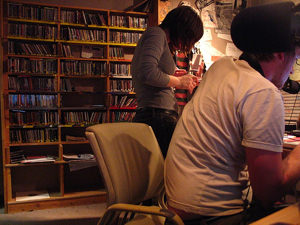The Cannibalization of College Radio
American university students are quickly losing an important means of sharing their passions and ideas with the public: college radio. Noncommercial student-run stations are being forced to the Web or elsewhere as college administrators sell their broadcast licenses to make some quick, much-needed cash. (more)
American university students are quickly losing an important means of sharing their passions and ideas with the public: college radio. Noncommercial student-run stations are being forced to the Web or elsewhere as college administrators sell their broadcast licenses to make some quick, much-needed cash.
In Nashville, Tenn., Mark A. Wollaeger, chairman of the board of Vanderbilt Student Communications Inc., recently approved the sale of his university’s FM license to an NPR affiliate for $3.35 million. He’s confident that listeners will follow student DJs onto the Internet or tune in through other formats, such as HD radio. But students who cite the simple, universal accessibility of traditional radio technology as a primary reason for the station’s large audience aren’t so sure. –ARK
Your support matters…The Chronicle of Higher Education:
To be sure, hundreds of student-run stations of varying levels of quality and professionalism continue to broadcast within the Federal Communications Commission’s historically designated noncommercial portion of the spectrum, 88.1 to 91.9 MHz. But in a trend that industry observers say began in the 1990s, many others have been driven onto the Web or into oblivion when college administrators have decided to sell their licenses for much-needed cash.
Three multimillion-dollar sales this year have drawn particular notice: the University of San Francisco’s KUSF-FM 90.3, Rice University’s KTRU-FM 91.7, and Vanderbilt University’s WRVU-FM 91.1—the last one announced just two weeks ago. In all three cases, the universities sold the broadcast licenses of their traditional free-form, student-programmed college stations to buyers who switched them to classical-music formats. And in all three cases, the DJ’s and supporters of the stations—which continue to stream their old formats on the Web—have complained loudly about the silencing of their terrestrial signals.
Independent journalism is under threat and overshadowed by heavily funded mainstream media.
You can help level the playing field. Become a member.
Your tax-deductible contribution keeps us digging beneath the headlines to give you thought-provoking, investigative reporting and analysis that unearths what's really happening- without compromise.
Give today to support our courageous, independent journalists.




You need to be a supporter to comment.
There are currently no responses to this article.
Be the first to respond.